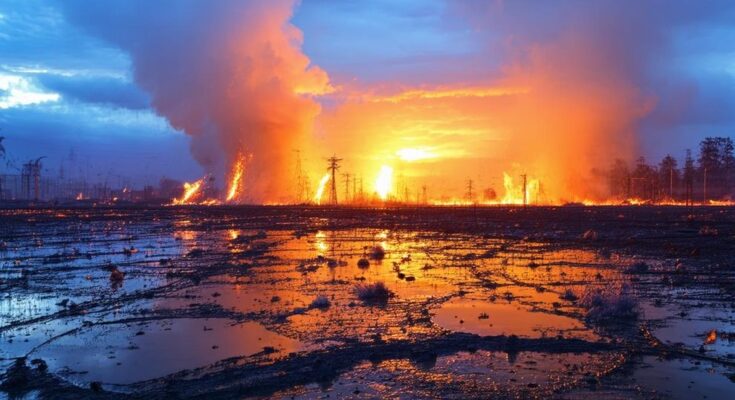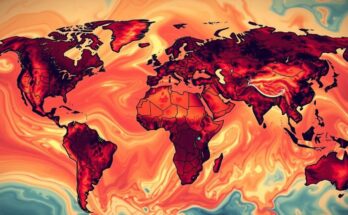The UN warns that the world is on track for a catastrophic rise of 3.1C in global temperatures due to insufficient action on climate change. The UN Environment Programme states that without unprecedented efforts to cut emissions, the goal of limiting warming to 1.5C is nearly unattainable. Current commitments by nations fall short, as emissions continue to rise.
The United Nations has issued a dire warning that the world is heading towards a catastrophic increase in temperature, potentially reaching 3.1 degrees Celsius this century due to insufficient efforts to curtail greenhouse gas emissions. In its comprehensive annual report, the UN Environment Programme (UNEP) highlighted a significant disparity between the necessary emissions reductions needed to limit global warming to 1.5 degrees Celsius and the actual commitments made by various countries. The UNEP report underscored that without unprecedented global mobilization to reduce emissions, the ambitious target established during the Paris Agreement of 2015 will soon be unattainable. The current trajectory indicates that unless immediate and decisive action is taken, the global temperature rise could range between 2.6 degrees Celsius and 3.1 degrees Celsius, contingent on the implementation of announced climate initiatives. These warnings come ahead of the essential UN Cop29 climate talks scheduled to take place in Baku, Azerbaijan, where it is imperative that nations formulate robust strategies to provide financial support for developing nations and bridge the emissions gap. The 2015 Paris Agreement set forth goals to maintain temperature increases to “well below” 2 degrees Celsius and to aspire toward the 1.5 degrees Celsius target compared to pre-industrial levels. Scientists contend that crossing the 1.5 degrees Celsius threshold could lead to catastrophic consequences, including severe climate events such as heatwaves, droughts, floods, and significant disruptions to natural ecosystems. While countries have established plans called nationally determined contributions (NDCs) aimed at achieving these targets by reducing reliance on fossil fuels and promoting carbon capture through habitat creation and restoration by 2030, the UNEP has indicated that these plans are falling short. Despite an increase in efforts, global greenhouse gas levels have continued to rise, with a notable 1.3 percent spike in 2023 alone. In fact, the G20 nations are responsible for 77 percent of global emissions, signifying the urgent need for leadership in climate action. UN Secretary General Antonio Guterres emphasized the critical juncture at which the world stands, asserting, “Either leaders bridge the emissions gap, or we plunge headlong into climate disaster — with the poorest and most vulnerable suffering the most.” He characterized the current climate trajectory as leading towards a catastrophic temperature rise and implored governments to expedite reductions in greenhouse gas emissions by transitioning away from fossil fuels, enhancing renewable energy sources, and combating deforestation. Inger Andersen, UNEP’s Executive Director, reiterated the urgent need for global mobilization, stating, “Climate crunch time is here. We need global mobilisation on a scale and pace never seen before — starting right now, before the next round of climate pledges — or the 1.5C goal will soon be dead and well below 2C will take its place in the intensive care unit.” She urged nations to prioritize actions that would align them with the 1.5 degrees Celsius pathway. Additionally, she noted that, even in the event of exceeding this critical goal, it remains vital to strive for a sustainable, net-zero future, as minimizing temperature increases can significantly mitigate adverse impacts on lives, economies, and biodiversity. To achieve the 1.5 degrees Celsius target, UNEP has called for an immediate 42 percent reduction in annual emissions by 2030, escalating to a 57 percent reduction by 2035. Achieving these reductions, although technically feasible, necessitates concerted global efforts led by the G20 to significantly enhance renewable energy capacity and advance energy efficiency, while protecting and restoring essential natural ecosystems.
The issue of global warming and climate change has become increasingly urgent in the context of international negotiations and commitments aimed at mitigating its effects. The United Nations and its agencies, particularly the UNEP, play a crucial role in assessing progress and presenting reports on emissions targets and climate initiatives. Despite countries ratifying the Paris Agreement in 2015, which aimed to limit global temperature increases, the current trend indicates a significant emissions gap that must be addressed to avoid catastrophic climate effects.
In conclusion, the UN’s recent findings illuminate the grave risks associated with inadequate climate action, highlighting a trajectory towards potentially devastating temperature increases. Immediate and robust global efforts are imperative to align with the 1.5 degrees Celsius target established by the Paris Agreement. Enhanced commitments from nations, particularly the G20, to significantly reduce greenhouse gas emissions and transition to sustainable energy sources are essential to avert climate disaster.
Original Source: www.independent.co.uk




